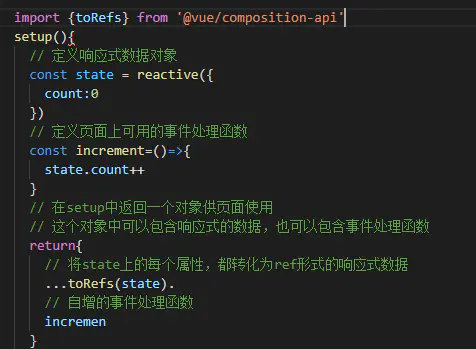[TOC]
ref: string
ref用来给元素或者子组件注册引用信息。引用信息会注册在父组件的$refs对象上。如果在普通的DOM元素上使用,引用指向DOM元素,如果在子组件上使用,引用指向组件实例。
<!-- `vm.$refs.p` will be the DOM node -->
<p ref="p">hello</p>
<!-- `vm.$refs.child` will be the child component instance -->
<child-component ref="child"></child-component>
$refs: [string]
保存ref的数组,使用this.$refs访问
toRefs()
toRefs()函数可以将reactive()创建出来的响应式对象,转换为普通对象,只不过这个对象上的每个属性节点,都是ref()类型的响应式对象。
通过ref()引用页面上的元素或者组件
- DOM引用
```vue
TemplateRefOne
2. 组件引用,父组件获取子组件的值,父组件templateRefOne.vue, 子组件templateRefTwo.vue
templateRefOne.vue
```vue
<template>
<div>
<h3>TemplateRefOne</h3>
<!-- 4. 点击按钮展示子组件的 count 值 -->
<button @click="showNumber">获取TemplateRefTwo中的count值</button>
<hr />
<!-- 3. 为组件添加 ref 引用 -->
<TemplateRefTwo ref="comRef" />
</div>
</template>
<script>
import { ref } from '@vue/composition-api'
import TemplateRefTwo from './TemplateRefTwo'
export default {
setup() {
// 1. 创建一个组件的 ref 引用
const comRef = ref(null)
// 5. 展示子组件中 count 的值
const showNumber = () => {
console.log(comRef.value.count)
}
// 2. 把创建的引用 return 出去
return {
comRef,
showNumber
}
},
components: {
TemplateRefTwo
}
}
</script>
templateRefTwo.vue
<template>
<div>
<h5>TemplateRefTwo --- {{count}}</h5>
<!-- 3. 点击按钮,让 count 值自增 +1 -->
<button @click="count+=1">+1</button>
</div>
</template>
<script>
import { ref } from '@vue/composition-api'
export default {
setup() {
// 1. 定义响应式的数据
const count = ref(0)
// 2. 把响应式数据 return 给 Template 使用
return {
count
}
}
}
</script>

